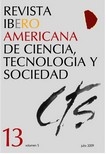Fontes de Informação para a Análise de Resultados e Impactos dos Programas de Bolsas de Pós-Graduação em Ciências e Engenharia na Ibero-América
DOI:
https://doi.org/10.52712/issn.1850-0013-854Palavras-chave:
ciência e tecnologia, avaliação de resultados e impactos, fontes de informação, formação de cientistas e engenheirosResumo
Este artigo revisa metodologicamente as fontes que fornecem ou podem fornecer informações relevantes para a avaliação dos resultados e impactos dos programas de bolsas de estudo para a formação de cientistas e engenheiros na Ibero-América. Em primeiro lugar, identifica e caracteriza três tipos de fontes comumente produzidas pelos organismos responsáveis pelos programas de bolsas e/ou geradas por diversas instituições: formulários, relatórios e/ou registros de avaliação de ex-bolsistas e/ou seus diretores ou anfitriões nos centros de I&D de acolhimento; informações estatísticas relacionadas a pós-graduados e a recursos humanos em ciência e tecnologia; e as diversas bases de dados internacionais, regionais e/ou nacionais existentes de publicações científicas e patentes. Em segundo lugar, descreve três tipos de fontes de informação que seriam pertinentes e recomendáveis desenvolver, consolidar ou explorar analiticamente na região: pesquisas sobre trajetórias acadêmicas e profissionais, expectativas de trabalho futuras e opiniões de ex-bolsistas e/ou seus diretores ou anfitriões; entrevistas individuais em profundidade e/ou grupos de discussão com diversos atores sociais que foram beneficiários indiretos das bolsas concedidas, bem como os próprios gestores dos programas de bolsas; e bases de dados padronizadas dos currículos (CVs) de pós-graduados e recursos humanos em ciência e tecnologia.
Downloads
Referências
ALBORNOZ, Mario y ALFARAZ, Claudio (2008): Diseño de una metodología para la medición del impacto de los centros de excelencia, documento de trabajo Nº 37, Buenos Aires, Centro de Estudios sobre Ciencia, Desarrollo y Educación Superior (REDES).
BARRERE, Rodolfo y FERNÁNDEZ POLCUCH, Ernesto (2007): "Alternativas metodológicas y su impacto en la comparabilidad internacional de los indicadores", en RICYT (2007): El Estado de la Ciencia 2007. Principales Indicadores de Ciencia y Tecnología Iberoamericanos / Interamericanos, Buenos Aires, RICYT, pp. 27-38.
BIOTTI, Eduardo y BAESSA, Adriano (2008): Características do Emprego dos Doutores Brasileiros. Características do emprego formal no ano de 2004 das pessoas que obtiveram título de doutorado no Brasil no período 1996-2003, Brasilia, Instituto Brasileiro de Produtividade e Qualidade (IBQP).
BOZEMAN, Barry, DIETZ, James y GAUGHAN, Monica (2001): "Scientific and technical human capital: An alternative approach to R&D evaluation", International Journal of Technology Management 22 (8), pp. 716-740.
DE FILIPPO, Daniela y FERNÁNDEZ, María Teresa (2003): "Bibliometría: importancia de los indicadores bibliométricos", en RICYT (2003): El Estado de la Ciencia 2002. Principales Indicadores de Ciencia y Tecnología Iberoamericanos / Interamericanos, Buenos Aires, RICYT, pp. 69-76.
DIETZ, James, CHOMPALOV, Ivan, BOZEMAN, Barry, O'NEIL LANE, Eliesh y PARK, Jongwon (2000): "Using the curriculum vita to study the career paths of scientists and engineers: An exploratory assessment", Scientometrics 49 (3), pp. 419-442.
D'ONOFRIO, María Guillermina (2008): "Nuevos abordajes metodológicos para la construcción de indicadores de recursos humanos en ciencia y tecnología", en Seminario Internacional sobre Nuevos Indicadores de Ciencia, Tecnología e Innovación, Ciudad de México, RICYT / Consejo Nacional de Ciencia y Tecnología (CONACYT) de México, noviembre.
D'ONOFRIO, María Guillermina (2009): "The public CV database of Argentine researchers and the '˜CV-minimum' Latin-American model of standardization of CV information for R&D evaluation and policy-making", Research Evaluation 18 (2), Special issue on the use of CVs in research evaluation, pp. 95-103.
FECYT (2003): Modelos de protocolos para la evaluación de actividades de I+D innovación, Madrid, Fundación Española para la Ciencia y la Tecnología (FECYT).
JARAMILLO, Hernán, PIÑEROS J., Luis, LOPERA O., Carolina y ÁLVAREZ, Jesús María (2006): Aprender haciendo. Experiencia en la formación de jóvenes
investigadores en Colombia, Bogotá, Facultad de Economía de la Universidad del Rosario.
JARAMILLO, Hernán, LATORRE SANTOS, Catalina, ALBÁN, Carolina y LOPERA, Carolina (2008): El hospital como organización de conocimiento y espacio de
investigación y formación. Los recursos humanos en salud y su tránsito hacia
comunidades científicas: el caso de la investigación clínica en Colombia, Bogotá, Facultad de Economía de la Universidad del Rosario.
LUCHILO, Lucas (2006): “Las trayectorias de los profesionales con doctorado: un estudio internacional”, en RICYT (2006): El Estado de la Ciencia 2006. Principales Indicadores de Ciencia y Tecnología Iberoamericanos / Interamericanos, Buenos Aires, RICYT.
REDES (2007): Producción de indicadores y relevamiento de fuentes de información científica, tecnológica y de innovación, Buenos Aires, Centro de Estudios sobre Ciencia, Desarrollo y Educación Superior (REDES).
REDES (2008): Evaluación de impacto del Programa de Formación de Científicos y Tecnólogos del Consejo Nacional de Ciencia y Tecnología (CONACYT) de México, Informe Final, Buenos Aires, Centro de Estudios sobre Ciencia, Desarrollo y Educación Superior (REDES).
Downloads
Publicado
Como Citar
Edição
Seção
Licença
Copyright (c) 2025 CC Attribution 4.0

Este trabalho está licenciado sob uma licença Creative Commons Attribution 4.0 International License.
Todas os números de CTS e seus artigos individuais estão sob uma licença CC-BY.
Desde 2007, a CTS proporciona acesso livre, aberto e gratuito a todos seus conteúdos, incluídos o arquivo completo da edição quadrimestral e os diversos produtos apresentados na plataforma eletrônica. Esta decisão é baseada no entendimento de que fornecer acesso livre aos materiais publicados ajuda a ter uma maior e melhor troca de conhecimentos.
Por sua vez, em se tratando da edição quadrimestral, a revista permite aos repositórios institucionais e temáticos, bem como aos sites pessoais, o autoarquivo dos artigos na versão post-print ou versão editorial, logo após da publicação da versão definitiva de cada número e sob a condição de incorporar ao autoarquivo um link direcionado à fonte original.











